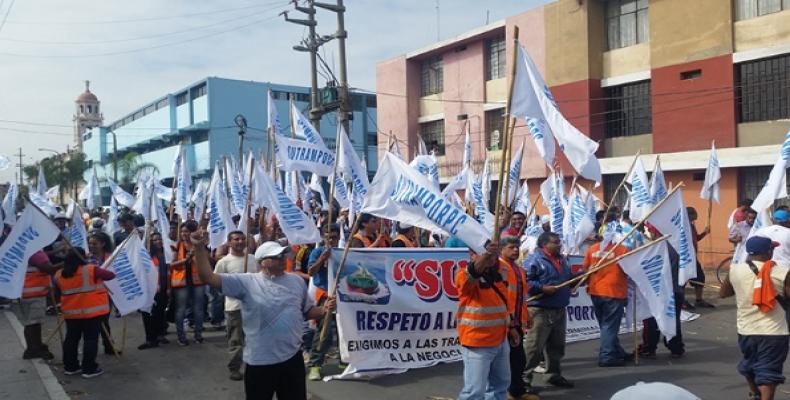Lima, May 22 (teleSUR-RHC)-- After 10 months of unresolved negotiations with the transnational company, APM Terminals, Peruvian longshoremen from the port of Callao, west of Lima, decided to take to the streets and march.
This latest demonstration follows an earlier strike against the transnational on May 13, with workers demanding wage increases commensurate with the company's profits, full health care coverage, and training.
The confrontation adds to the already 175 active conflicts in the country that president Ollanta Humala has to deal with. The issue is important for the administration because APM is the third largest terminal operator in the world and receives 35 percent of all cargo entering Peru.
In 2014, APM derived almost $17 billion of its net profits from operations in Peru alone. A total 650 longshoremen, comprising 95 percent of the APM port workforce, have joined the strike.
One, Ricardo Mora, said port laborers are “exposed to the harshness of the weather, the rain, the high heat, the contamination, the overnight shifts with humidity”. He added that they “need health coverage to deal with the occupational sickness that is afflicting us because of this job.”
Other workers face health issues due to their constant contact with lead, chlorine, and raw cement. The Defense Secretary of the longshoremen union is Geraldo Honores. He expanded on the demands of the workers and argued that “what the company wants is us to continue producing like we produce at the moment. But they refuse to gives us health care plans and that is bad for the image of the company. It is a transnational with a great deal of money. When they came to Callao, they said money is the least of our worries and that they would give us all the benefits possible. However, they are not fulfilling their promise.”
In other social conflicts involving confrontations with big businesses in the country, President Humala has sided with the companies and not the popular movements. The longshoremen claim that the President’s reaction to their situation has been the same as the government has allegedly sent the Navy to replace the striking workers and perform their duties. Workers also complained that none of the local TV outlets have covered their side of the story. Under such circumstances, the longshoremen are determined to continue the strike indefinitely.


